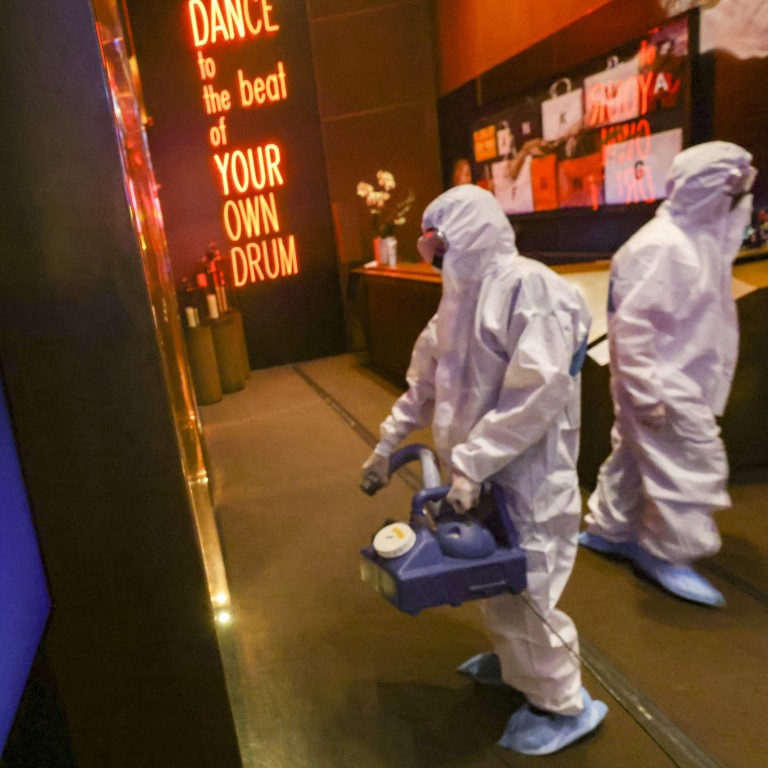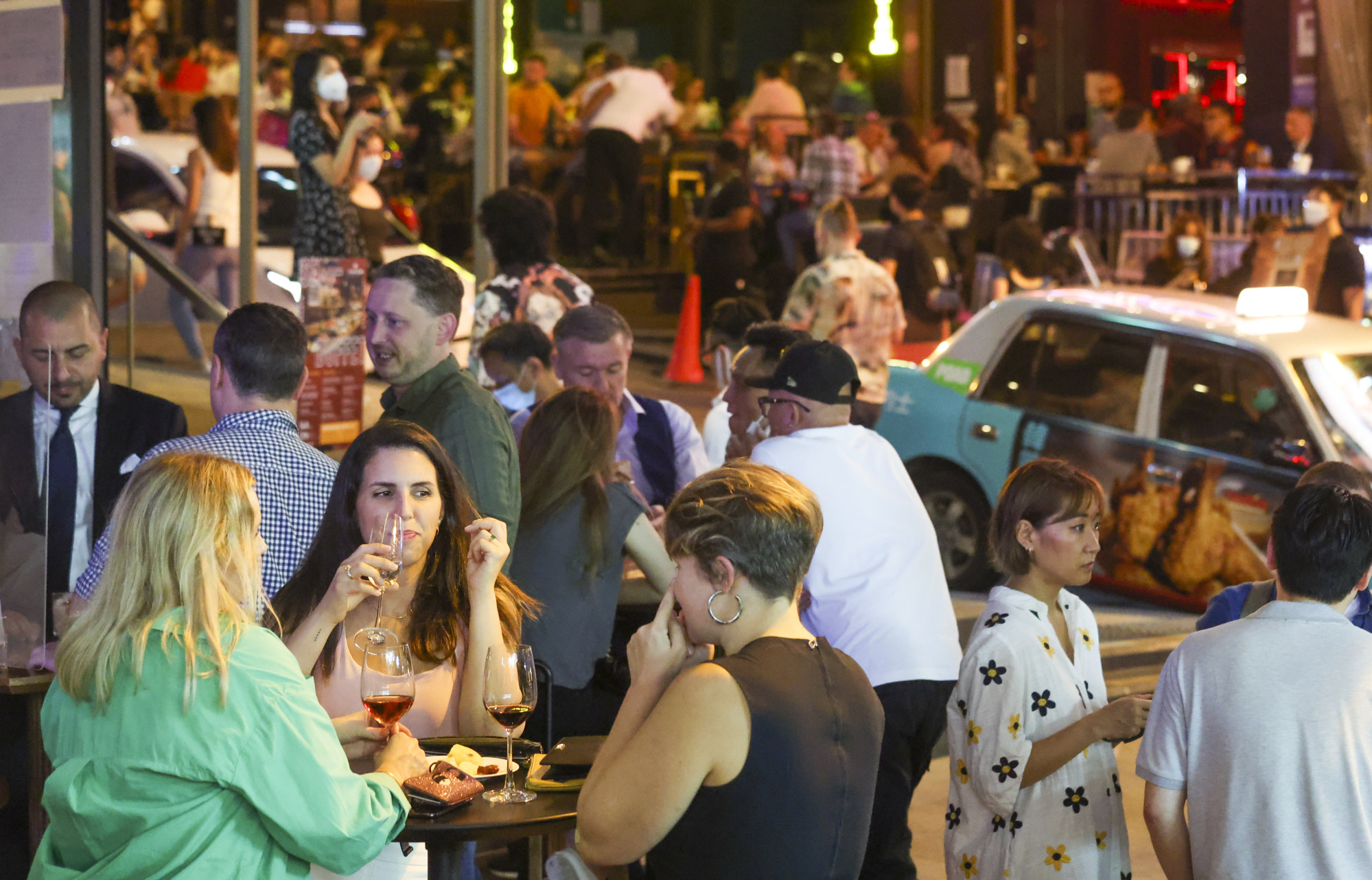
Hong Kong health officials change how they present daily number of Covid-19 infections
- Authorities confirm 752 coronavirus infections, excluding 97 imported ones
- Patrons of city’s nightspots will be required from Thursday to show proof of negative rapid test result to enter premises
Hong Kong health authorities changed how they presented the number of Covid-19 cases on Tuesday by separating imported infections from the overall daily tally, while also announcing new measures to tackle a resurging fifth wave.
Authorities reported 752 coronavirus infections, excluding 97 imported ones. Under the previous system, the daily caseload stood at 849. The change of presentation method was more clearly identified in a press statement issued on Tuesday evening.
Earlier in the day, the city’s health minister revealed that residents would need to show proof of a negative Covid-19 rapid test to enter bars, pubs or clubs starting on Thursday as clusters linked to the city’s nightlife district continued to worsen.
The announcement came as the Hospital Authority said it would form a new contingency command centre to speed up the allocation of resources in the event of a rapid surge in cases.
Hong Kong schools post most number of Covid cases since return to classrooms
Citing the identification of several outbreaks connected to nightspots, Secretary for Food and Health Sophia Chan Siu-chee said authorities were concerned patrons and operators of such premises had not complied with anti-epidemic rules.
The new measure announced by Chan is expected to last until June 29, with customers required to produce proof of a negative result from a rapid antigen test (RAT) taken within 24 hours of submitting it to venue staff. Anyone who failed to comply with the measure would be denied entry to the premises.
“[The measure] will allow a better control of risks related to the transmission of the virus,” the health minister said.
Irene Young Bick-kwan, director of the food and environmental hygiene, said patrons would need to produce proof of their recent negative RAT result before they could enter any nightspots.
“They would need to present a photo showing the negative test result, along with the customer’s name, testing date and time on the testing kit,” she said, adding that law enforcement officers would be able to discern if any information provided was fake.
While specific details regarding the penalty for violating the new rule would only be available in a gazette notice on Wednesday, regulations for the prevention and control of disease for businesses and premises stated that customers or staff providing false information could be subject to a fixed penalty of HK$5,000 (US$636).
People in charge of the business who failed to comply with requirements under the regulation could also face a maximum fine of HK$50,000 and imprisonment of six months.
Chan added that authorities would also ramp up inspection efforts at select premises, noting officials had already visited thousands of eateries, bars and pubs since early June.
According to Young, some bars and pubs had violated the requirements for venue staff, such as by submitting valid negative RAT results, wearing masks and using their vaccine pass.
Since late May, several coronavirus clusters have been linked to popular nightspots located in the city’s entertainment district, with at least six venues reporting about 350 infections.
As part of coronavirus containment measures, Chan said authorities would also strictly implement the rule of sending close contacts to specific isolation facilities if they had shared a bathroom or bedroom with a patient.
“To safeguard against the threat of Covid-19 variants, if infected patients share a bathroom or bedroom with family members, the government will arrange them for quarantine at designated facilities, to protect their and their family’s health,” she said.
Hong Kong leader in travel warning on city status as 851 Covid cases logged
Government pandemic adviser Professor David Hui Shu-cheong said the new rule for patrons at bars and clubs could screen out people who had high viral loads, but warned there could still be problems authenticating test results.
“There is no way to know whether that specimen truly belongs to that person,” he said. “If we want to know the identity [of the person who did the test], the test must be done at the site.
“The [new rule] might not help a lot but is more like a gesture showing that officials take this issue seriously.”
Businessman Allan Zeman, founder of nightlife district Lan Kwai Fong, said he understood the government and Beijing’s concerns ahead of July 1, given the possibility that state leaders could visit Hong Kong to celebrate the anniversary of the city’s return to Chinese rule.
Chief Executive Carrie Lam Cheng Yuet-ngor had earlier pledged that the government would “wholeheartedly devote itself to creating conditions” for state leaders to visit at the end of the month.
But Zeman said the latest arrangement would prevent patrons from visiting nightspots in an impromptu manner. He added that some venues were already considering offering RAT services before entry.

Meanwhile, coronavirus clusters related to the city’s nightlife district continued to worsen, with the outbreak connected to Racks City in Central reporting an additional case, bringing its total to 22. The number of infections linked to FLM in Sheung Wan also increased, rising to 28 after four more cases were uncovered.
Schools in the city reported an additional 134 infections involving 112 institutions, with five campuses forced to suspend several classes until the end of the week.
On the same day, Director of Health Dr Ronald Lam Man-kin said different data parameters had already indicated a rising epidemic trend, with the average daily case positive rate at community testing centres and mobile stations almost doubling from 0.29 per cent to 0.53 per cent over the past two weeks.
The latest reproductive number of the coronavirus as of June 6, compiled by the University of Hong Kong, had also increased to 2.057, meaning one patient could infect more than two other people.
In response to the rise in infections, Chan said that officials could reopen community isolation facilities “immediately” if needed, but the minister did not specify the case threshold for relaunching the centres.
Most coronavirus-related deaths in Hong Kong were ‘likely caused by Covid-19’
Dr Tony Ko Pat-sing, chief executive of the Hospital Authority, said resources to combat any surge in virus cases could also be quickly mobilised thanks to the new contingency command centre.
“If we need to mobilise lots of manpower and beds within a short period of time, we could turn seven clusters into one cluster via this command centre,” he said, referring to the seven public hospital groups based on their geographical locations.
Public hospitals had been previously accused of reacting too slowly during the peak of the fifth coronavirus wave, which occurred around late February to early March, with the delay resulting in dozens of frail patients, including elderly people, waiting for treatment outside centres during cold weather.
Hong Kong’s tally of confirmed cases currently stands at 1,220,761, with 9,391 related fatalities.
Additional reporting by Victor Ting and Chris Lau

